Margarita Gracheva's ex-husband cut off her hands. Now, her own TV show is helping other victims of violence
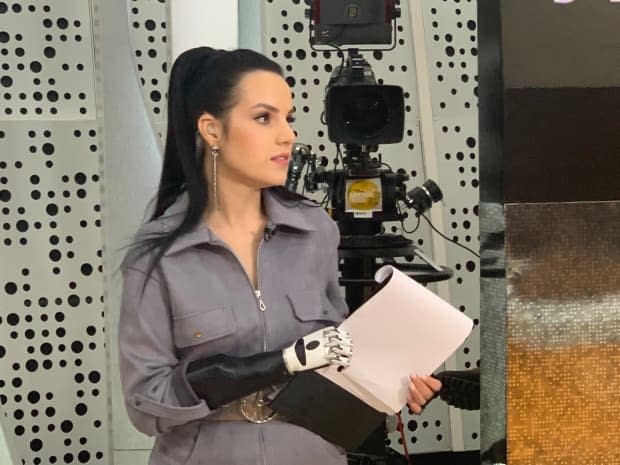
Ten hours under the hot lights of a TV studio listening to appalling stories of spousal abuse and depressing indifference from Russian authorities had left Margarita Gracheva visibly upset and exhausted.
"You really do get tired and worried about people when you hear their stories — it's difficult," said the 28-year-old mother of two during a break in the taping of the program Blizkiye Lyudi or Intimate People.
Gracheva, whose own horrific experience with a psychotic husband ended with her being kidnapped, attacked with an axe and having both hands severed, has just started a new chapter in her life after being named co-host.
The program is a first-of-a kind venture on the Russia 1 Channel that makes domestic violence front and centre as it tries to put audience members and viewers into some of the awful situations faced by abused women.
The effort to strengthen protections against domestic violence in Russia has been intensely disheartening, so the fact that such a program was ever green-lighted is notable, said Gracheva.
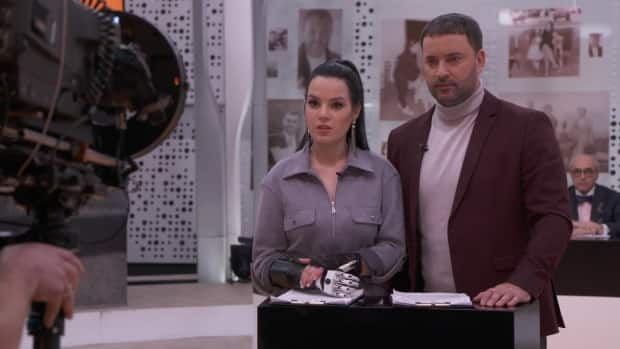
Her co-host, well-known Russian TV personality Leonid Zakhoshansky, said Gracheva's mutilated body bears witness to an ordeal guests can associate with.
"It's frightening, a very frightening story. She is very strong, very strong."
In December 2017, in a jealousy-fuelled rage, Gracheva's then-husband, Dmitri Grachev, drove her to an isolated wooded area outside their home in St. Petersburg and repeatedly struck her with an axe, delivering more than 40 blows to every part of her body.
Grachev hacked off both of her hands, leaving her disfigured for life.
The fact that her pulverized bones and flesh fell into the snow and were kept cold meant doctors were able to reattach one hand, the left, although she has little movement in it.
Sophisticated artificial hand
At the end of her right arm, she now uses a sophisticated artificial hand that is connected to her muscles so she can use it to grasp objects and even make some fine motor movements.
Her ex-husband was sentenced to 14 years in jail.
In the months leading up to his savagery, Gracheva tried multiple times to get the attention of authorities, including after he threatened her with a knife.
She said police told her since he had not physically hurt her, there was nothing they could do and the case was closed.
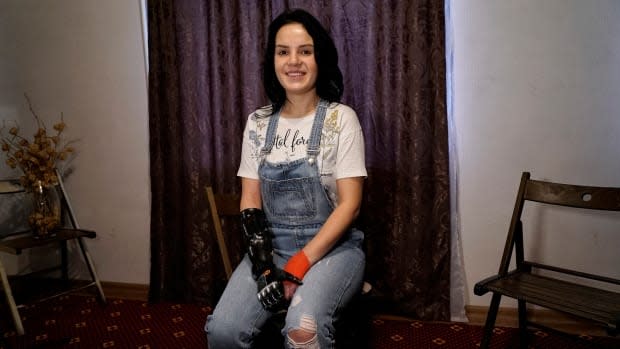
Our CBC News Moscow bureau first met Gracheva in December 2019 when she spoke at length about her ordeal and her determination to forge ahead in a new life with a new purpose.
After her appointment as co-host of the TV show, we met with her again recently on the set in Moscow.
Personally, Gracheva now appears to be thriving.
WATCH: Russian woman gets TV show on spousal abuse after ex-husband's horrific attack:
In addition to landing the new high-profile job, she has remarried and said her two boys, eight and six, are in good spirits despite all that's happened.
The format of her new program sees women who have suffered physical abuse from their partners or some other form of mistreatment tell their stories.
They are then offered advice or counselling by a selection of lawyers, psychologists and members of the audience.
'Help with real action'
"The goal of the program is to help — not just to talk to but to help with real action," said Gracheva, whose role appears to be less of an interviewer and more of a compassionate presence.
One segment featured the story of Elena Verba, a young mother who was stabbed 57 times by her husband, a police officer, who left her to die and then went to work.
The couples' young son found her later in a pool of blood and called his father on the phone saying, "Mommy wouldn't wake up."
At one point, Verba had gone to her husband's supervisors at the police station to try to get him charged, but they resisted, saying it would cost him his pension.
Verba's mother, Anna, made an emotional appearance on the program that left Gracheva and many members of the audience in tears.
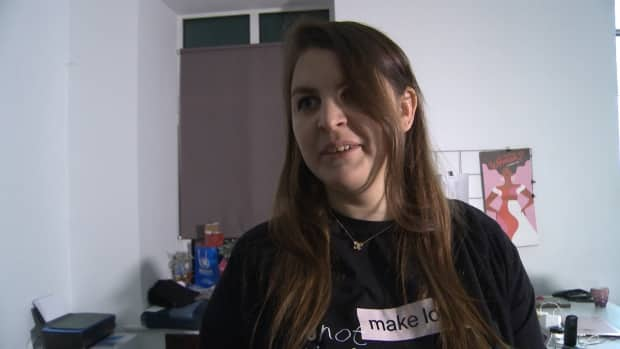
On a more positive note, another woman whose husband had kidnapped her children and threatened to kill her used her appearance on the program to gather up the courage to leave the family home and take refuge in a women's shelter with her kids.
"This is not my job, not my profession," Gracheva said of her role as a de facto counsellor, noting that the long, emotional days do not come easy to her.
"I really do worry about all these cases and live out their stories through myself."
Beyond Gracheva's own successes with the show and her family, other progress for women coping with family violence issues has not been as promising.
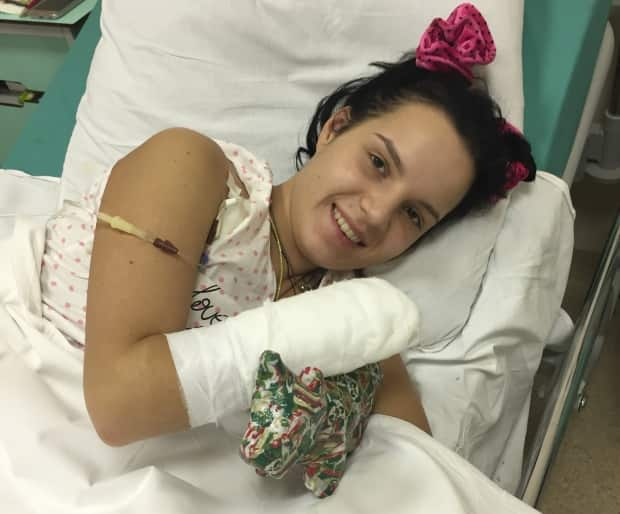
Russia was already an outlier among developed countries for its weak legislation on domestic violence.
Restraining orders are non-existent and there are virtually no legal means for women to keep violent partners out of the family home.
In 2017, Russia's Duma — or parliament — made domestic violence that doesn't involve broken bones a misdemeanour, akin to getting a traffic ticket.
Furious women's groups and non-governmental organizations that had been pushing to stiffen penalties ran into dogged resistance from Orthodox church groups.
What appeared to be a promising initiative to introduce new legislation in the Duma — it was even championed by a prominent female member of President Vladimir Putin's ruling United Russia party — was stalled by the pandemic and has since fizzled.
Groups designated 'foreign agents'
Then at the end of 2020, as part of a sweeping bid to limit the influence of non-Russian organizations in domestic politics, Putin signed into law a bill that designates many groups with anti-domestic violence agendas as "foreign agents," undercutting their work further.
It's a Soviet-era term that invokes extremely negative connotations of spying and treason and essentially robs local NGOs of their ability to fundraise.
"We need to write on these billboards that we are foreign agents. And, of course, nobody wants to put it on," said Anna Rivina, the Moscow-based founder of Nasiliu.net (No to Violence), which supports victims of violence.
"They believe that we want to ruin Russian families. They believe that this is something from the West, something about 'MeToo,' about feminism— that it's not common for Russian society."

Rivina was in a Moscow court last week trying to get the designation overturned, but to no avail.
Statistics on domestic violence in Russia are hard to come by but Rivina's group claims three-quarters of Russian women will experience domestic violence from a partner at some point in their lives. That figure comes from research published by a team at a St. Petersburg university in 2019.
The COVID-19 pandemic appears to have made the situation even worse.
In March 2020, Russia's human rights ombudsman was quoted in state media as saying calls to a domestic abuse hotline more than doubled from 6,054 to more than 13,000 when the city of Moscow was locked down.
Well-known Moscow criminal lawyer Alexander Dobrovinsky is one of Blizkiye Lyudi's expert panellists who believes Russia needs many more such forums to discuss domestic violence. Because of that, he volunteered his time to help those who appear as guests.
"It's much easier to change the law than to change the mentality," he told CBC. "When you change the mentality, it takes much more time than everything else, and the mentality of a lot of people in our country is that family violence is something very logical.
"It's my home. I close the door to you. I do whatever I want because I'm the master here. And that's awful."

